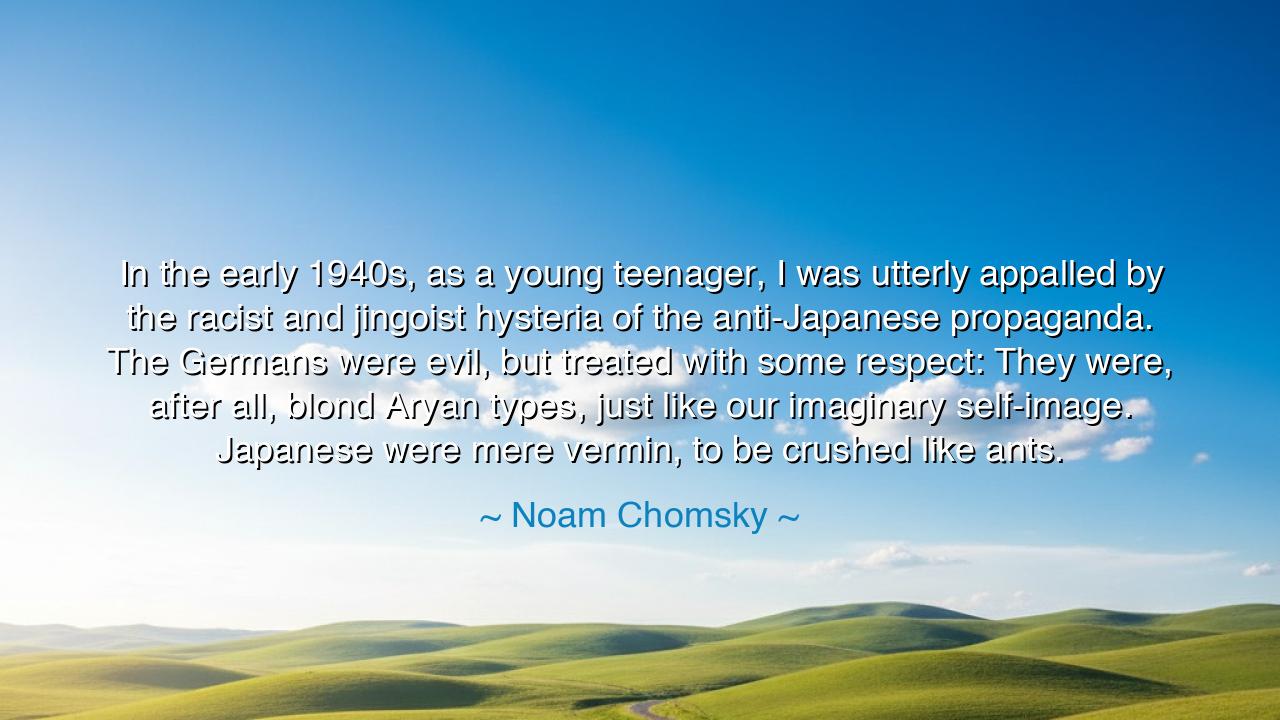
In the early 1940s, as a young teenager, I was utterly appalled
In the early 1940s, as a young teenager, I was utterly appalled by the racist and jingoist hysteria of the anti-Japanese propaganda. The Germans were evil, but treated with some respect: They were, after all, blond Aryan types, just like our imaginary self-image. Japanese were mere vermin, to be crushed like ants.






Hearken to the words of Noam Chomsky, whose reflection illuminates the dark interplay of fear, prejudice, and propaganda in human history. He recounts that in the early 1940s, as a young teenager, he was utterly appalled by the racist and jingoist hysteria of the anti-Japanese propaganda. In these words lies a timeless warning: societies, even those priding themselves on virtue, can be swept into moral blindness when fear and prejudice overshadow reason and humanity. The young Chomsky perceived that perception of “the other” is often manipulated, leading to dehumanization and injustice.
Since antiquity, philosophers and historians have chronicled the dangers of xenophobia and propaganda. From the poleis of Greece to the courts of Rome, outsiders were frequently depicted as lesser, monstrous, or dangerous to justify conquest and exclusion. Chomsky’s reflection echoes this enduring truth: fear, amplified by cultural narratives, can warp judgment and sanctify cruelty, leading ordinary people to accept—or even celebrate—the suffering of those deemed different.
Chomsky continues with a piercing observation: “The Germans were evil, but treated with some respect: They were, after all, blond Aryan types, just like our imaginary self-image. Japanese were mere vermin, to be crushed like ants.” Here is the ancient lesson of selective empathy: humans often extend dignity and moral consideration only to those who resemble themselves, while dehumanizing those who do not fit their constructed ideals. The moral peril of this selective view is timeless, recurring in wars, colonization, and social hierarchies across the ages.
Consider the story of Plato’s Allegory of the Cave, which warns that perception shaped by false narratives leads to ignorance and moral error. In wartime America, propaganda functioned as a shadow on the wall: the public saw the Japanese through the lens of fear and caricature, believing the “truth” of their supposed inferiority. Chomsky’s own horror as a teenager reflects the clarity that arises when one steps beyond these shadows, seeing both the humanity of the other and the manipulations that distort perception.
The historical lesson is further illuminated by the internment of Japanese Americans during World War II. Entire families were removed from their homes, deprived of freedom and dignity, based not on individual actions but on collective prejudice amplified by propaganda. Chomsky’s reflection reminds us that dehumanization can become systemic, sanctioned by law and culture alike, unless individuals cultivate critical awareness and moral courage to resist it.
The moral truth emerges: empathy, vigilance, and reason must guide human action. Fear and nationalism, when unchecked, can twist morality, making cruelty appear justified. By recognizing the mechanisms of propaganda and the biases that privilege similarity over justice, individuals and societies safeguard the principles of dignity and equality that are the foundation of civilization.
Practical guidance flows naturally: cultivate critical thought, question narratives that devalue the other, and resist the impulse to accept fear-driven portrayals uncritically. Educate oneself and others about history’s lessons in dehumanization, and act to protect the rights and humanity of all, regardless of resemblance or affiliation. In doing so, one resists the seduction of hysteria and prejudice.
Thus, heed the wisdom of Noam Chomsky: recognize the danger of racist and jingoist narratives, and confront the subtle ways fear distorts judgment. By embracing empathy, critical thinking, and moral courage, one honors the humanity of all and prevents the repetition of history’s darkest errors. Let this vigilance guide each generation, ensuring that the bonds of justice and reason triumph over the corrosive power of propaganda and prejudice.






AAdministratorAdministrator
Welcome, honored guests. Please leave a comment, we will respond soon